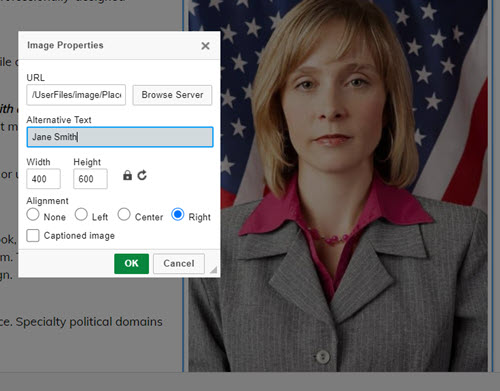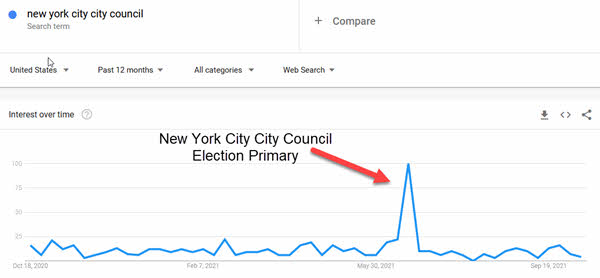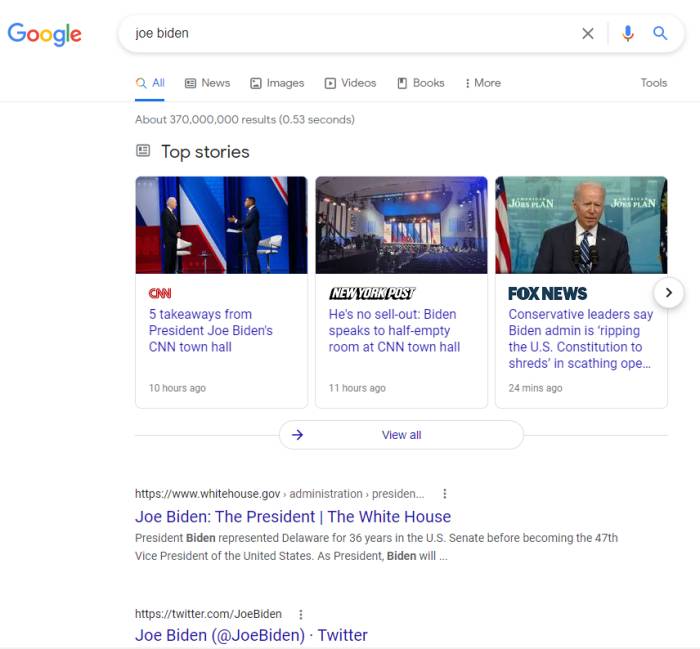What’s worse than a candidate not having a campaign website? It’s having a website that no one can find. Search engine optimization (SEO) is a way of creating your content to make your site more attractive to search engines and helping it rank higher for related queries.
Why is SEO important for politicians? It’s not just social media that has an influence, but according to studies, search rankings can even have an influence over voters. Politicians or public figures should look to political SEO as part of an overall campaign marketing strategy.
To improve your site rankings on Google, Bing and Yahoo, use these basic strategies:
Optimize your political campaign website
A political candidate website needs optimization to increase online visibility. When a voter searches for a political candidate, the official website of the candidate should appear in the first search result, followed by related social media profiles and content. There are several elements that can help achieve a top ranking position.
Start with the right domain name
The domain you pick for your website is important for search optimization. Choose a clean, succinct domain that is adaptable for print and potentially reusable for future campaigns. The candidate’s name or variant (johnsmith.com or votejohnsmith.com) often makes the best name. Keep your domain name short, and avoid using a year or elected position, as they may become irrelevant in the future.
Use proper page titles
The page title is an important search ranking element. Page title tags should clearly relate to their page. The page title is displayed in the top border of the web browser. This serves as an anchor so that the visitor knows where they are. Most web browsers only display the first 95 characters. If it is longer than 95 characters, browsers will simply crop the tag. Every page on your site should have its own unique page title.
Write interesting meta descriptions
The description meta tag is what usually displays as a link description in search engine result pages (SERPs). Create individual meta descriptions for each page. This tag is intended to be a brief and concise summary of each page’s content.
- Include the candidate name, elected position sought and the district or location.
- One or two sentences is best. Anything longer will get truncated.
- Each page should have it’s own unique description that describes the page, even if it is slight variant of the others.
- Try to make your page descriptions compelling, so people will want to click on the search result.

Make your page titles and descriptions relevant and compelling.
Optimize your images by including descriptions. Alt tags, also known as “alt descriptions” are used within HTML code to describe a page image’s appearance and function. For example, if you include a picture of a candidate, set your image alt tag as a description like, ‘Bob Smith, Candidate for TinyTown Mayor’. This will help your page rank for the candidate’s name, and there’s a good chance the image itself may appear in image search results.

Add a description alt tag to your images, particularly your candidate head shots.
Page titles, description tags and image alt tags can be set within your Online Candidate Site Administration. Each sample page contains a description tag that you can customize.
One thing to watch for with images is how large you make them. Large image files can make a page load slowly. Google may penalize slow websites in rankings, so you’ll want your images to be sized properly in both pixel and file size.
You can check your site’s loading speed through Google’s PageSpeed Insights Tool. It will tell you your overall speed and give you feedback on how you can speed it up.
Your content should include the critical text necessary for Google (and visitors) to know who you are and what you are running for. This information should include your full location (including state), primary or election date, contact information and any appropriate disclaimers. More on this below.
Politics and relevancy: Create content that works
How relevant is your content to what is being searched? Optimizing starts with a good domain name. For example, if you can include the candidate’s name in the domain, that helps a lot. Most recent presidential candidates included their full name in the domain. This includes donaldjtrump.com, joebiden.com and hillaryclinton.com. You can’t get more relevant than the exact name.
A ‘thin site’ contains very little content. A ‘thin’ political website may just consist of a home page, contact page and maybe a donation page. With only a few content pages, there just isn’t enough meat for a search engine to know what the site is about. (Voters won’t glean much information, either.)
In our experience, we’ve seen clients who expand their content beyond a few basic pages quickly start to rank.
To get indexed properly, your website should have at least 8-10 pages of solid content. That includes your home page, about information, issue pages and blog posts. Don’t count contact, forms and disclaimer pages toward this number. The best way to put enough meat on your site is to write about what is important to your cause. This can be done through issue pages along with news updates and additional material.
Craft pages specifically for each major election issue.
Include relevant phrases (TinyTown traffic, traffic in TinyTown, Tinytown traffic problems, etc.) in your page title and throughout the body of your text, where appropriate. Break your text into manageable chunks and use subheadings to make your material readable and logical. Link out to related sources. If your page is about traffic, link out to relevant articles or online traffic studies addressing the problem.
Cross-link pages within your website.
Where it makes sense within the content of a page, link to your other pages. For example, you may have a list of important issues on your home page. You will want to link from the phrase ‘TinyTown traffic’ or ‘traffic in TinyTown’ directly to your issue page. This cross-linking will act as a signal to build relevancy. Avoid using generic links like, “Click here”.
Social media accounts are a big help.
Related links help build overall relevance, which help web pages rank for related queries. Social media accounts (not individual posts) provide valuable links back to your site. Make sure you add your site to your social media profiles.
In addition to internal links within your site, you’ll want to create backlinks (or links from other online sources) to your website.
Backlinks are the currency of the web
Links between websites help determine how and what appears in search results. Even having a few links can help your site start to rank in Google.
The easiest backlinks come from your social media accounts. In the profile section, make sure your social accounts link to your website. When you post new material to your site, make sure you share it through your social media accounts.
Inform newspapers and local news portals. Notify your local media about your latest updates or press release. This includes both local newspapers and sites that cover your geographic area. Use your press releases for this purpose. Again, if possible, have any web links from these sources point directly to specific issue pages rather than your site home page.
Target keyword phrases related to your election and the issues
The most important goal of a campaign website is to rank for a candidate’s name. This can be achieved with a solid SEO strategy. This includes having a website that focuses on the candidate and has relevant links from social media accounts and from articles about the candidate.
Let’s assume that you already have a website, and you’ve done enough to appear for candidate name and elected office queries.
Great, but that doesn’t mean your work is done.
What else are your voters and constituents looking for? What are the hot topics and issues of the day? Have you built pages addressing around them? This means making the page title, meta description and page content focused on a particular phrase or related phrases.
For example, during the 2020 presidential election, Joe Biden’s website was able to dominate on issue topics such as immigration, gun laws, healthcare and women’s rights. He was able to achieve results on Google over Donald Trump by having organized, targeted content that addressed those issues.
Ranking for a high-volume keyword may bring in a lot of traffic, but if that term is irrelevant to voters, what’s the point? Target political SEO keywords and phrases that focus on the narrow interests of your voters. Many of these keywords will be obvious to you, such as names, locations, districts and major local issues. Localized search results will be more relevant to the voters in your district.
There are also keyword tools, including using Google’s Keyword Tool or Facebook’s Insights.

You can take advantage of larger trends and research what people are searching for.
With some time, you can have your own content appear in one or more top ten results for your target phrases related to your city, county, or state. It takes effort to map out your goals and put together a plan, but the results provide a healthy boost in traffic and exposure to voters.
And that’s the real goal of online domination!

Search results including top stories for President Joe Biden.
Create search engine accounts to get indexed
Creating search engine accounts for your campaign is highly recommended. Start by creating a Google Account. You may have your own personal Gmail account, but you should create an account specifically for your organization.
Many of our clients create a campaign Gmail account as a way to get started. Accounts are free and allow you access to a number of useful services, including AdWords, Analytics, and more. The Google Search Console provides detailed information about your site’s visibility, what other sites link to you, opportunities to diagnose issues, and information on how visitors arrive at your site.
- Submit to Google Console at https://www.google.com/webmasters/
- Submit to Bing and Yahoo at https://www.bing.com/toolbox/webmaster.
Tip: Don’t submit your website until it is ready for public viewing.
Applying basic optimization tactics to your election website will go a long way to attract more traffic. That means more people to see your message – and potential volunteers and donors.
Manage your online reputation
The rise of the Internet has changed the way we do politics. It’s now more important than ever to protect your campaign from misinformation. Candidates need to keep an eye as to what appears in searches. This is an aspect of online reputation management.
Your online identity is important. The goal is to control online what appears about you and anything related to you.
- Your website and social profiles will generally tend to appear in the top results.Your social profiles should be complete and regularly updated in order for them to remain relevant.
- Using online reputation management strategies can help can keep positive content appearing in searches. If you have bad listings that appear, try to replace that material with more positive pages, optimized site content, press release and/or news articles.
- If you can get negative material pushed past the first page results, you are probably safe because the majority of people never look past the first page of search results.
A smart management strategy, along with online reputation monitoring will help keep you front and center before voters.
Using a political SEO campaign to help win your election
On the first campaign we worked on in 2003, we were able to promote negative news articles against and incumbent opponent. It got to the point where a search for the opponents name would only show a list of negative results. The opponent didn’t even have a campaign website until late in the season, but he still couldn’t overcome the unflattering content we had backlinked.
These days, it’s far more difficult to use these strategies against a political opponent. Your time and effort is better spent enhancing your own online reputation than trying to take down someone else.
We can help optimize your site
Having your content appear within the first page of results could be the difference between winning or losing an election. We can help with technical issues as well as improving your content to help optimize your site and improve rankings. Schedule a consultation to improve your digital strategy.
Online Candidate websites are SEO-friendly right from the start. Start your digital campaign today!
Related:
- Why Your About Page Ranks Higher Than Your Home Page
- 6 Website Secrets Your Political Opponent Doesn’t Know
- Easy Link Building Tips For Your Political Campaign
How Much Does a Political Website Cost? »







